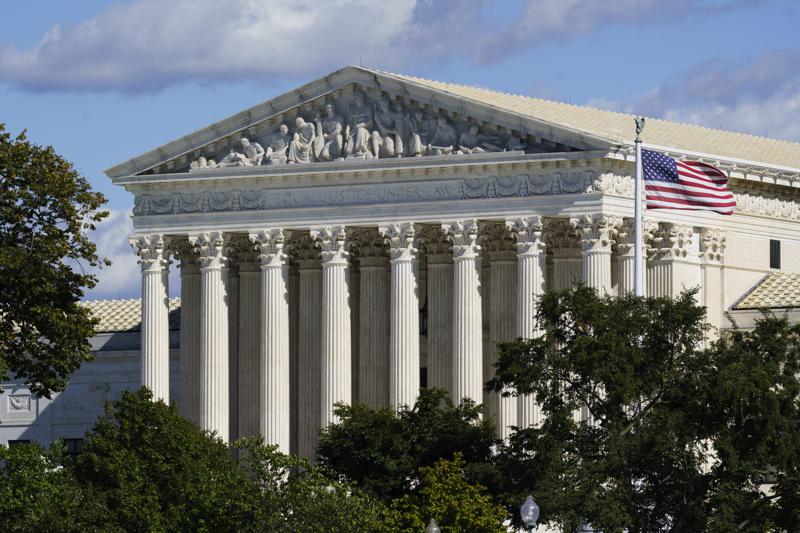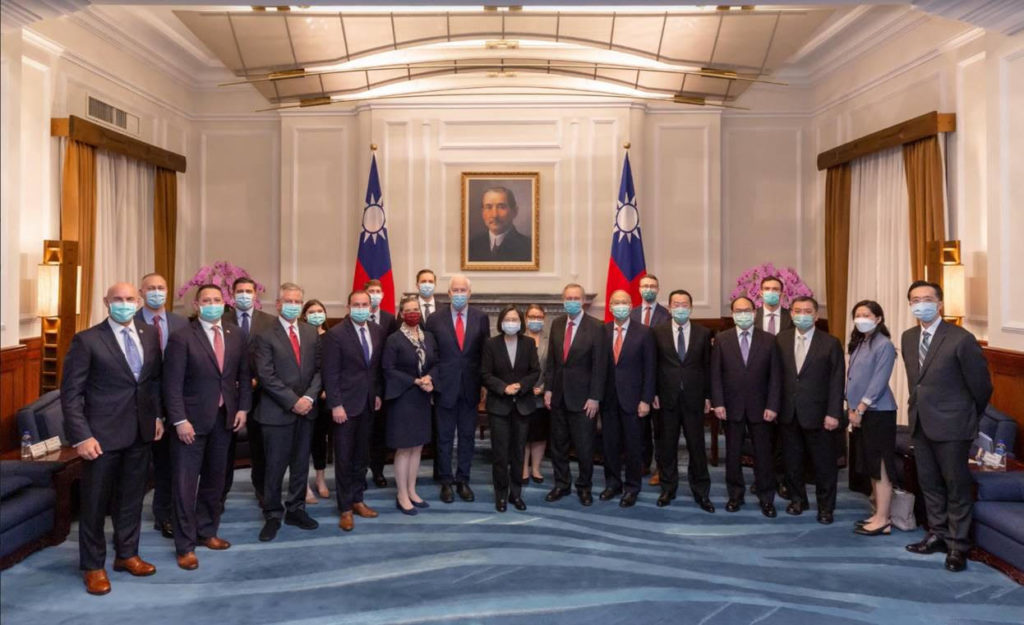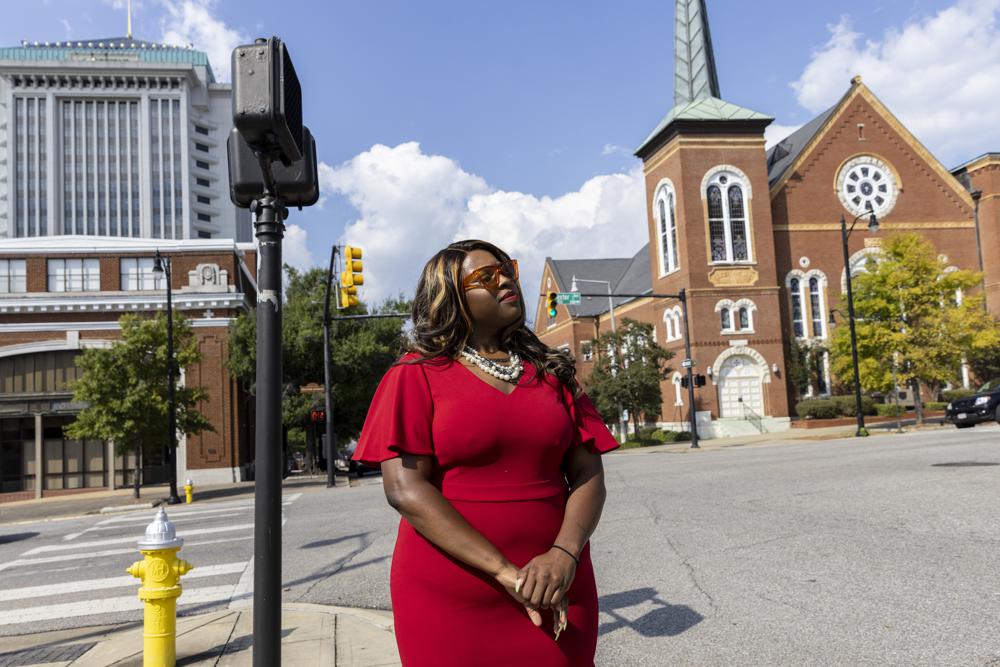U.S. Supreme Court hears oral arguments on case challenging Alabama redistricting

On Tuesday morning, the U.S. Supreme Court heard the case of Merrill versus Milligan. The case will decide whether or not Alabama’s redrawn congressional map violates Section 2 of the Voting Rights Act of 1965 (VRA). Evan Milligan, the Director of Alabama Forward, sued in federal court, claiming that the 2021 redistricting congressional map prepared and passed by the Alabama Legislature dilutes the voting power of African Americans in the state. In Alabama, African Americans make up over 27% of the eligible voters, but six of the seven Congressional districts are majority White. Congresswoman Terri Sewell is the only African American in Alabama’s Congressional Delegation and is the only Democrat to hold any office higher than State Senator in the state of Alabama. She attended today’s oral arguments. “We in Alabama are no strangers to the fight for fair representation,” said Rep. Sewell. “After all, it was in Selma—almost six decades ago—where John Lewis and so many Foot Soldiers shed blood on a bridge for the equal right of all Americans to vote. But today, we know that old battles have become new again. As the Voting Rights Act of 1965 remains on life-support, states across the nation are racing to restrict voting access to dilute our power and erase our progress. Today, they are taking aim at one of the last remaining provisions of the VRA, Section 2.” “Fair representation matters,” continued Sewell. “I urge our Justices to do what is right and uphold the protections that our foremothers and forefathers fought so hard to secure. I also urge the Senate to do its job and pass the John R. Lewis Voting Rights Advancement Act to restore the full power of the VRA.” In 2013 Sewell attended the oral arguments of the Supreme Court’s Shelby v. Holder case which Shelby County challenged Section 4 of the Voting Rights Act, claiming that the section which required that the state get preclearance for any voting changes, including redistricting, was obsolete. The conservative majority of the Supreme Court agreed with Shelby County and the City of Calera and invalidated Section 4. The result of that decision meant that the Biden Justice Department did not have to give preclearance to the 2021 redistricting and other voting law changes that have occurred since Shelby v. Holder. Milligan and his attorneys claim that the six majority to 1 majority-minority split by the legislature (which mirrors the 2010 redistricting that was approved by the Obama Justice Department) is a violation of Section 2. Milligan and Alabama Forward argued that the state should have two Black-majority districts. John Merrill is Alabama’s Secretary of State and, as such, is tasked with being the state’s top election official. A lower court panel of three judges agreed with Milligan, but the State of Alabama appealed to the Supreme Court, resulting in a stay of the lower court decision. The state has argued that the only way to create two majority-Black districts would be to focus solely on race, which the state argues the Supreme Court has already directed them not to do. The state has also argued that such a map would unnecessarily disturb communities of interest, such as putting Baldwin and Mobile, Alabama’s two coastal counties a consideration, in different districts. The court could affirm that the Alabama Legislature got it right, or the court could order a new map to be drawn. It would be up to the court whether that new map would be drawn by the Legislature or by the court itself. Alabama Today has obtained four alternative maps that have been drawn, creating either creating two majority-minority districts or, failing that, two districts that would likely be won by a minority, including one that does not divide counties. To connect with the author of this story, or to comment, email brandonmreporter@gmail.com.
Tommy Tuberville objects to cuts to veterans pharmacy network

U.S. Senator Tommy Tuberville and 15 of his Senate colleagues sent a letter Friday to Seileen Mullen, Acting Assistant Secretary of Defense for Health Affairs, seeking answers about TRICARE beneficiaries’ ability to maintain access to local pharmacies. On October 24, unless the VA can reach a new agreements with Express Scripts and other providers, thousands of local community pharmacies will not be able to service 9.6 million TRICARE patients and their families. Express Scripts is terminating the contract with TRICARE on October 24 instead of waiting for them to expire at the end of the year, heightening concerns that millions of veterans and their families will not be able to get their medicines at their neighborhood pharmacies. “It has been brought to our attention that Express Scripts has reduced reimbursements for prescriptions dispensed at in-network retail pharmacies for 2023,” wrote Tuberville and the other Senators. “These reductions may leave many retail pharmacies unable to participate in the TRICARE Pharmacy Program, thus significantly impacting 9.6 million TRICARE beneficiaries’ access to local pharmacies. Most recently, Express Scripts notified pharmacies and beneficiaries that current 2022 pharmacy contracts will expire October 24, 2022, rather than the end of the year. This will only further reduce the pharmacy network for TRICARE patients and their families and may force beneficiaries to change pharmacies at a time when many receive annual vaccinations.” “Pharmacists continue to be one of the most accessible health care providers in the United States,” the Senators continued. “Over 90 percent of Americans live within five miles of a community pharmacy, and 76.5 percent of pharmacies in rural areas are independent community pharmacies. As you know, in addition to dispensing medications and vaccines, community pharmacies provide services that lead to better health outcomes, lower overall administrative fees, and valuable in-person consultations with a healthcare provider.” Tuberville was joined in the letter by Sens. Tom Cotton (R-Arkansas), Roger Marshall (R-Kansas), Cindy Hyde-Smith (R-Mississippi), Chuck Grassley (R-Iowa), Steve Daines (R-Montana), John Boozman (R-Arkansas), Marsha Blackburn (R-Tennessee), Shelley Moore Capito (R-West Virginia), John Thune (R-South Dakota), Jerry Moran (R-Kansas), Mike Rounds (R-South Dakota), John Barrasso (R-Wyoming), Deb Fischer (R-Nebraska), Mike Braun (R-Indiana), and Cynthia Lummis (R-Wyoming). 15,000 pharmacies will leave the TRICARE network on October 24. To connect with the author of this story, or to comment, email brandonmreporter@gmail.com.
Barry Moore aide Sherry McCormick jailed Monday for insurance fraud

Sherry McCormick, an aide to Congressman Barry Moore, was indicted on Monday for insurance fraud. McCormick is the director of special constituent services and events for Rep. Moore, where she works in his Dothan office. McCormick turned herself in to the Geneva County Jail following the indictment by a grand jury. AL.com reported that she is on administrative leave from Moore’s service. McCormick was previously convicted in the federal court system for health care fraud in Georgia and served eight months in prison. McCormick was ordered to pay $447,705.11 in restitution to the federal and Georgia government as part of her sentence. An indictment is simply an accusation that a grand jury believes should be heard in court. McCormick has not had the opportunity yet to mount a defense. Everyone is presumed to be innocent until found guilty by a jury of their peers. To connect with the author of this story, or to comment, email brandonmreporter@gmail.com.
Jimmy Blake criticizes Kay Ivey’s tax rebate plan

Alabama Governor Kay Ivey announced on Monday that she may soon introduce a plan to provide rebates to Alabama taxpayers, but citing the possibility of future economic uncertainty Ivey said that it would be reckless to introduce structural changes to the state’s tax structure. Libertarian nominee for Governor Dr. James “Jimmy” Blake has been urging for permanent tax cuts, not one time tax rebates. Blake spoke on the phone with Alabama Today on Monday night following the Governor’s announcement. “She hasn’t considered cutting the size of government,” Blake said. “She won’t do anything that will help anybody in the long run.” “How is the state going to compete with a five percent income tax rate, when the states around us have a lower rate or no state income tax at all?” Blake said. “Why not commit to decreasing the size of state government and get it out of the people’s pockets.” Blake dismissed the Ivey promise of some tax rebates. “You won’t be able to compete with that,” Blake said. “It is election time, so she talks about some tax relief. She is going to do what she has done before, which is increase the burden on Alabama taxpayers.” Blake has called for reducing the state income tax rate, with a goal of eventually eliminating the tax altogether. “There are clearly plenty of Republicans who agree with what we are saying,” Blake said. The state’s 2022 fiscal year ended on Friday, with the state of Alabama ending the year with an extra $2 billion in surplus to carry over to 2023. Ivey said that making structural changes to the tax code would be a mistake. “Many predict – and I agree – a potential downswing in the economy is right around the corner,” Ivey said. “We must ensure both Alabama and her citizens are in the best possible position to weather any future economic circumstances. We all know the bills have got to be paid one day, and we cannot make permanent structural change because of temporary circumstances. Anyone who tells you otherwise is likely looking to score political points – just as our federal government has done with their massive spending.” Ivey faces Libertarian nominee Dr. Blake and Democratic nominee Yolanda Rochelle Flowers in the November 8 general election. Flowers has advocated for eliminating the four percent sales tax on groceries and replacing that revenue with a lottery. To connect with the author of this story, or to comment, email brandonmreporter@gmail.com.
National Federation of Independent Businesses endorses Katie Britt for U.S. Senate

Republican nominee for U.S. Senate Katie Boyd Britt announced on Monday that her campaign has been endorsed by the National Federation of Independent Business (NFIB), the nation’s leading small business advocacy organization. The NFIB endorsement was announced at a campaign event hosted at NFIB member small business Tang’s Alterations in Montgomery on Friday. “Katie Britt has shown a strong commitment to small business, especially during the COVID-19 lockdown,” said Rosemary Elebash, NFIB Alabama State Director. “NFIB worked closely with Katie when she represented the Business Council of Alabama. We were partners on multiple issues with the Governor’s office, including implementing Alabama Small Business Grants, replenishing the Alabama Unemployment Trust Fund to avoid a 500% tax increase, passing COVID-19 liability protection for businesses, and serving together on the Lt. Governor’s Small Business Emergency Task Force Committee to ‘Reopen Alabama Responsibly.’ During the campaign, Katie has visited with small business owners in all 67 counties and heard their concerns about government overreach with taxes, mandates, rules, and regulations. She will work closely with NFIB to promote policies to assist small businesses when she is elected to the U.S. Senate.” The endorsement was issued by NFIB FedPAC, NFIB’s political action committee. NFIB FedPAC is funded by voluntary contributions by NFIB members over and above their membership dues. Decisions made by the NFIB FedPAC are managed by a member-driven grassroots evaluation. “We are confident that Katie Britt will be a voice for small business owners in Congress,” said Sharon Sussin, NFIB Senior National Political Director. “She has proven to be a consistent small business supporter and understands the challenges small business owners face. We are pleased to endorse her today.” “I’m honored to have the endorsement of NFIB and Alabama’s incredible small businesses,” said Katie Britt. “Growing up as the daughter of two small business owners in the Wiregrass, I saw firsthand the challenges my parents faced and the sacrifices they made for our family and their team members — just as small business owners across Alabama do every day. In the U.S. Senate, I’m going to be a champion for small businesses in every corner of our great state, and I’ll fight to ensure Main Streets are able to grow and thrive.” Prior to her run for Senate, Britt was the President and CEO of the powerful Business Council of Alabama (BCA), a close ally of NFIB. Britt has already announced the respective endorsements of the Home Builders Association of Alabama, the Alabama Farmers Federation’s FarmPAC, the Alabama Retail Association, Manufacture Alabama, the Automobile Dealers Association of Alabama, the Alabama Forestry Association, the Associated Builders and Contractors of Alabama, the League of Southeastern Credit Unions, the Alabama Restaurant and Hospitality Association, University of Alabama Crimson Tide legend Siran Stacy, Mobile Mayor Sandy Stimpson, the Alabama Mining Association, U.S. Senator Tom Cotton, former White House press secretary Sarah Huckabee Sanders, U.S. Senator Joni Ernst, the Alabama Rural Electric Association of Cooperatives, former President Donald Trump, the National Association of Realtors PAC, Associated General Contractors of America PAC, U.S. Senator Tim Scott, U.S. Senator Tommy Tuberville, National Right to Life, and SBA Pro-life America. Britt grew up working at several small businesses. She is an attorney and is a former chief of staff for U.S. Senator Richard Shelby, whose seat she is running for. Shelby is retiring at the end of the year and has endorsed Britt. Britt has a bachelor’s degree from the University of Alabama and a law degree from the University of Alabama School of Law. She is a native of Coffee County and is a graduate of Enterprise High School. Britt is married to former University of Alabama and New England Patriots football player Wesley Britt. They reside in Montgomery with their two children. Britt faces Libertarian nominee John Sophocles and Democratic nominee Dr. Will Boyd in the November 8 general election. To connect with the author of this story, or to comment, email brandonmreporter@gmail.com.
Black representation in Alabama tested before Supreme Court

The invisible line dividing two of Alabama’s congressional districts slices through Montgomery, near iconic sites from the civil rights movement as well as ones more personal to Evan Milligan. There’s the house where his grandfather loaded people into his station wagon and drove them to their jobs during the Montgomery Bus Boycott as Black residents spurned city buses to protest segregation. It’s the same home where his mother lived as a child, just yards from a whites-only park and zoo she was not allowed to enter. The spot downtown where Rosa Parks was arrested, igniting the boycott, sits on one side of the dividing line, while the church pastored by the Rev. Martin Luther King Jr., who led the protests, sits on the other. The lines are at the center of a high-stakes redistricting case bearing Milligan’s name that will go before the U.S. Supreme Court on Tuesday, setting up a new test of the Voting Rights Act and the role of race in drawing congressional boundaries. At the center of the case is a challenge by various groups arguing that the state violated the federal Voting Rights Act by diluting the political power of Black voters when it failed to create a second district in which they make up a majority, or close to it. African Americans account for about 27% of the state’s population but are the majority in just one of the state’s seven congressional districts. “Our congressional map is not reflective of the population that lives in Alabama,” said Milligan, 41, one of several voters who joined interest groups in filing the lawsuit. The case the Supreme Court will take up Tuesday centers on whether congressional districts in Alabama were drawn to reduce the political influence of Black voters, but it’s also part of a much broader problem that undermines representative government in the U.S. Both major political parties have practiced gerrymandering — drawing congressional and state legislative boundaries to cement their hold on power — but Republicans have been in control of the process in far more states since after the 2010 elections. That has allowed them to win an outsized share of statehouse and U.S. House seats and means GOP policies — including on abortion restrictions — often don’t reflect the will of most voters. An Associated Press analysis from 2017 showed that Alabama had one of the most gerrymandered congressional maps in the country. Republicans dominate elected office in Alabama and are in charge of redistricting. They have been resistant to creating a second district with a Democratic-leaning Black majority that could send another Democrat to Congress. A three-judge panel that included two appointees of President Donald Trump ruled unanimously in January that the Alabama Legislature likely violated the Voting Rights Act with the map. “Black voters have less opportunity than other Alabamians to elect candidates of their choice to Congress,” the panel said. The judges ordered state lawmakers to draw new lines for this year’s election and create a second district where Black voters either made up a majority or near majority of the population. But on a 5-4 vote in February, the Supreme Court sided with Alabama to allow this year’s congressional elections to take place without adding a second predominantly Black district. Two justices suggested it was too close to spring primaries to make a change. The lawsuit claims the Alabama congressional map dilutes the voting strength of Black residents by packing a large number of them into a single district — the 7th, where 55% of voters are Black — while fragmenting other communities. That includes the state’s Black Belt region and the city of Montgomery. The current districts leave the vast majority of Black voters with no realistic chance to elect their preferred congressional candidates anywhere outside the 7th district, the lawsuit contends. “This is just about getting Black voters, finally, in Alabama, the opportunity to elect their candidates of choice. It’s not necessarily guaranteeing that they will have their candidate elected,” said Deuel Ross, senior counsel at the NAACP Legal Defense and Educational Fund, which is representing the plaintiffs. The groups contend that the state’s Black population is large enough and geographically compact enough to create a second district. Milligan, who is six generations removed from enslaved ancestors who lived in the Black Belt, ticked off the consequences for Black residents who are not able to have representation that aligns with their needs: addressing generational poverty, the lack of adequate internet service, Medicaid expansion and the desire for a broader array of health care services. “In choosing not to do that, you’re denying the people of the Black Belt the opportunity to elect an additional person that can really go to the mat on their interests,” said Ross, who is one of the attorneys who will argue the case in a challenge backed by the Biden administration. African Americans served in Alabama’s congressional delegation following the Civil War in the period known as Reconstruction. They did not return until 1993, a year after the courts ordered the state to reconfigure the 7th Congressional District into a majority-Black one, which has since been held by a succession of Black Democrats. That 1992 map remains the basis for the one in use today. “Under numerous court challenges, the courts have approved this basic plan. All we did is adjust it for population deviation,” said state Rep. Chris Pringle, a Republican and chairman of the legislative committee that drew the new lines. Alabama argued in court filings that the state’s Black population is too spread out to be able to create a second majority district without abandoning core redistricting principles such as keeping districts compact and keeping communities of interest together. Drawing such a district, the state argued, would require mapping acrobatics, such as connecting coastal areas in southwest Alabama to peanut farms in the east. In a statement to The Associated Press, Alabama Attorney General Steve Marshall said the map is “based on race-neutral redistricting principles that were approved by a bipartisan group of legislators.” He said it looks similar to
Alabama sets execution date for Kenneth Eugene Smith

Alabama has set a November execution date for a man convicted in the 1988 murder-for-hire killing of a pastor’s wife. The scheduled execution follows criticism over the state’s last two lethal injection attempts, including one that was called off after the execution team had trouble finding a vein. Kenneth Eugene Smith, 57, is set to die at Holman Correctional Facility on November 17, according to a Friday order from the Alabama Supreme Court. Smith was sentenced to death for the killing of Elizabeth Dorlene Sennett, a 45-year-old grandmother and pastor’s wife. Prosecutors said Smith was one of two men who were each paid $1,000 to kill Sennett on behalf of her husband, the Rev. Charles Sennett, who was deeply in debt and wanted to collect on insurance. Elizabeth Sennett was found dead on March 18, 1988, in the couple’s home in Colbert County. The coroner testified that she had been stabbed eight times in the chest and once on each side of the neck. The pastor killed himself a week later. Smith maintained it was the other man who stabbed Elizabeth Sennett, according to court documents. Smith was initially convicted in 1989, and a jury voted 10-2 to recommend a death sentence, which a judge imposed. His conviction was overturned on appeal in 1992. He was retried and convicted again in 1996. This time, the jury recommended a life sentence by a vote of 11-1, but a judge overrode the jury’s recommendation and sentenced Smith to death. Alabama no longer allows a judge to override a jury’s recommendation. In 2017, Alabama became the last state to abolish the practice of letting judges override a jury’s sentencing recommendation in death penalty cases, but the change was not retroactive and therefore did not affect death row prisoners like Smith. John Forrest Parker, the other man that prosecutors said was paid to kill Elizabeth Sennett, was executed in 2010. When asked if he had any final words, Parker turned his head to face Mike and Charles Sennett, the victim’s sons, and said, “I’m sorry. I don’t ever expect you to forgive me. I really am sorry.” Alabama last month called off the execution of Alan Miller because of difficulty accessing the inmate’s veins. Alabama Corrections Commissioner John Hamm told reporters that “accessing the veins was taking a little bit longer than we anticipated,” and the state did not have sufficient time to get the execution underway by a midnight deadline. That was at least the third time Alabama has acknowledged problems with venous access during a lethal injection. The state’s July execution of Joe Nathan James took more than three hours to get underway. And, in 2018, Alabama called off the execution of Doyle Hamm after being unable to establish an intravenous line. Republished with the permission of The Associated Press.
Justin Bogie: Lower taxes, better education are keys to attracting business to Alabama, not incentives

The Alabama Jobs Act is set to expire on July 31, 2023, meaning that economic incentives could be a major topic of interest during next year’s regular legislative session. The chatter has already begun. Last month, Alabama Secretary of Commerce Greg Canfield told a state economic incentive oversight committee that he thought the act should be extended and the current annual credit cap of $350 million should be removed. But is handing out hundreds of millions of taxpayer dollars in economic incentives to large corporations each year sound fiscal policy? More importantly, are there other steps Alabama can take to make itself more competitive in attracting new businesses compared to neighboring states? If you are unfamiliar with the Alabama Jobs Act, it was first authorized by the Legislature in 2015 and provides payroll and investment credits to qualifying business projects that, with some exceptions, create at least 50 new jobs in the state. The program was reauthorized during the 2021 regular session, and the current cap on credits is $350 million per year. The law specifies that $20 million per year must be targeted to counties with populations less than 25,000. Before thinking about expanding or removing the cap on incentives, the first question legislators should ask is this: do economic incentives work? Evidence suggests that they do not. A 2019 report from the Mercatus Center at George Mason University found state and local governments nationwide give out an estimated $95 billion in economic incentives per year. In contrast, those same governments in total collected less than $66 billion in corporate income taxes in 2019. A supposed benefit of economic incentives is that it will create new jobs in Alabama. According to the Brookings Institution, on average, only 10-30% of the new jobs created through economic incentives end up being filled by state residents who are unemployed. Many of the new positions will end up being filled by Alabama residents who are already working or from new employees coming from outside the state. This means the cost of public services inevitably rises. Brookings estimates this increase in the cost of services offsets any increased tax revenues from wages by at least 90%. Incentives are particularly ineffective in states with low unemployment rates, where at best, citizens who are already employed will shift to a different company or career. Alabama’s unemployment rate is currently at a record low of 2.6%. Another downfall of economic incentives is they allow state and local governments to pick winners and losers. It means that companies already conducting business in the same industry as a new company that moves to Alabama will be paying higher tax rates. All Alabamians pay the price. The state does not just give away $350 million in tax incentives every year. The money is recouped through a higher tax burden on not only other corporations but citizens as well. Economic incentives also favor large corporations over small businesses. A 2015 study by Good Jobs First found big businesses received 90% of state and local economic incentives. In most cases, at least 50 new jobs must be created to receive incentives in Alabama. What does that do for the small family-run business that employs ten people? They are already at a disadvantage compared to larger companies. Economic incentives aimed at large corporations make it even harder for small businesses to survive. Instead of giving out more economic incentives, Gov. Kay Ivey and the Alabama Legislature should be looking for ways to fundamentally make Alabama more competitive with neighboring states in attracting new businesses. The two primary areas of focus should be tax policy and education. In terms of corporate income tax rates, Alabama’s rate is higher than Georgia, Florida, Mississippi, Arkansas, South Carolina, North Carolina, and Kentucky in the Southeast, making it one of the worst in the region. Lower corporate tax rates mean lower costs of doing business in the long term, not just during the period of economic incentives. It levels the playing field for both small and large companies. On the individual income tax side, Florida and Tennessee have no income taxes. Georgia and Mississippi have already enacted legislation to reduce rates over the next few years. If Alabama wants to be competitive and incentivize citizens to remain living and working in Alabama, it must follow suit. There is also the issue of education. Businesses considering moving to Alabama need a qualified workforce if they are going to be successful. Alabama consistently ranks near the bottom in national test scores and the worst in the Southeast, well below Florida, Tennessee, Georgia and Mississippi. A recent column by former Alabama State Superintendent of Education Joe Morton highlighted that in 2021, 16% of Alabama’s high school graduates were not college or career ready. He asked, “What signal does it send to business and industry?” Not a good one. These are the issues Alabama’s government should be focused on improving if it wants to attract new businesses and keep existing businesses in Alabama. They do not want handouts. They want lower taxes, less government interference, and a capable workforce. Economic incentives should be Alabama’s last resort in securing new businesses. Lower tax rates and a better-educated workforce will be enough incentive. It will also improve the lives of all Alabamians. Justin Bogie is the Senior Director of Fiscal Policy for the Alabama Policy Institute.

